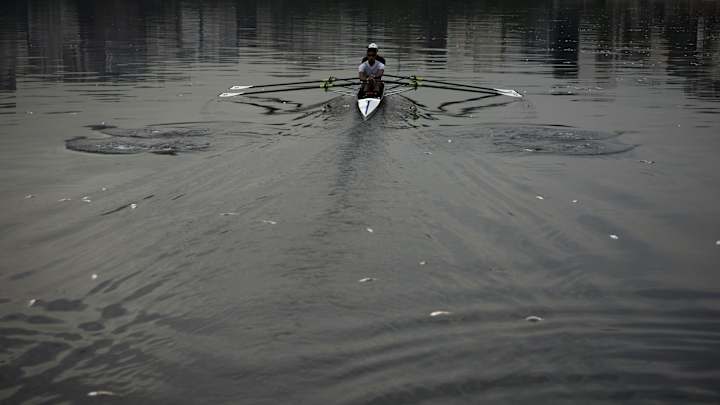37 tons of dead fish removed from Rio Olympic rowing venue

RIO DE JANEIRO (AP) Fish continued to die by the ton Thursday in a Rio de Janeiro lake that's slated to host Olympic rowing events, while city authorities and biologists argued about the cause of the die-off.
Rio's Comlurb waste management company said that as of Wednesday night, it had collected more than 37 tons of dead fish from the Rodrigo de Freitas lake since the die-off started late last week.
Garbage collectors were out in force again on Thursday to rake dead fish off the water's surface, and Comlurb said the effort would continue till the die-off subsides.
The decomposing fish, a small silvery species called twaite shad, were trucked to the city's main dump.
But an overwhelming stench still enveloped the lake, sparking complaints by angry neighbors and passers-by.
Such die-offs are common in Rio, where rivers, lakes and even the ocean are blighted by raw sewage and garbage. In February, twaite shad died en masse in the blighted waters of the Guanabara Bay, where the Olympic sailing events are to be held.
Rio's environmental secretariat insisted Thursday that the latest incident is the result of a sudden change in water temperature.
''The intense rains that happened last week and a rise in the sea levels led to a spike in the (sea) water entering the lake, causing a thermal shock,'' it said in a statement, reporting that water temperature in the lake fell by 4 degrees Celsius (7.2 degrees Fahrenheit) in a short period of time.
However, several scientists rejected that explanation, saying that pollution is really to blame.
Estefan Monteiro da Fonseca, an oceanographer at the Fluminense Federal University, said the official explanation ''makes no sense.''
''The lake continues receiving large quantities of sewage,'' he said, adding that the it ''has large concentrations of sulfur because of the organic material dumped into it, and depending on the winds, that material rises to the surface and kills fish.''
Rio's water quality has become one of the most contentious issues heading into the 2016 Olympics. Authorities have long said that the games would be the catalyst for a major cleanup of the city's waterways, but as the showcase sporting event approaches with few improvements, authorities are now admitting that the Olympic promises won't be met.
Rio Governor Luiz Fernando Pezao acknowledged earlier this week ''there's not going to be time'' to finish the cleanup ahead of the games, suggesting it might wrap up by the end of 2018 instead.
Sailors have repeatedly voiced concerns about possible health and safety threats posed by competing in Rio's waters.
Fonseca, the oceanographer, warned that if another fish die-off occurs during the games in August 2016, ''Rio's image could suffer irreparable damage.''
--
Associated Press writer Stan Lehman in Sao Paulo and Renata Brito in Rio de Janeiro contributed to this report.
